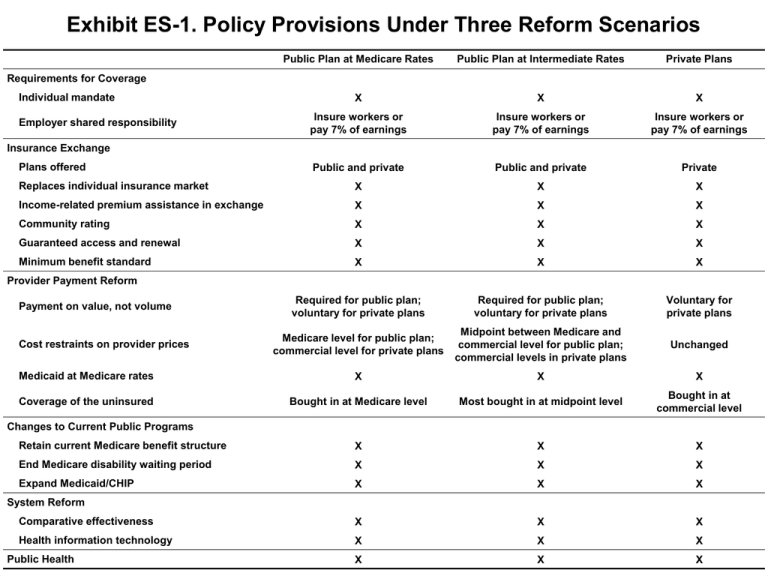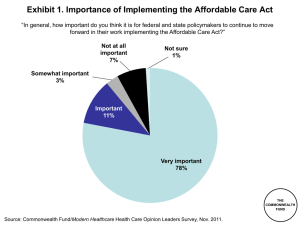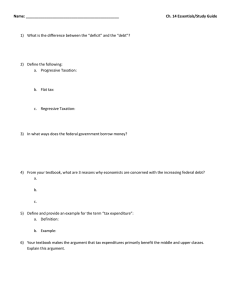Chartpack
advertisement

Exhibit ES-1. Policy Provisions Under Three Reform Scenarios Public Plan at Medicare Rates Public Plan at Intermediate Rates Private Plans X X X Insure workers or pay 7% of earnings Insure workers or pay 7% of earnings Insure workers or pay 7% of earnings Public and private Public and private Private Replaces individual insurance market X X X Income-related premium assistance in exchange X X X Community rating X X X Guaranteed access and renewal X X X Minimum benefit standard X X X Required for public plan; voluntary for private plans Required for public plan; voluntary for private plans Voluntary for private plans Medicare level for public plan; commercial level for private plans Midpoint between Medicare and commercial level for public plan; commercial levels in private plans Unchanged Medicaid at Medicare rates X X X Coverage of the uninsured Bought in at Medicare level Most bought in at midpoint level Bought in at commercial level Retain current Medicare benefit structure X X X End Medicare disability waiting period X X X Expand Medicaid/CHIP X X X Comparative effectiveness X X X Health information technology X X X X X X Requirements for Coverage Individual mandate Employer shared responsibility Insurance Exchange Plans offered Provider Payment Reform Payment on value, not volume Cost restraints on provider prices Changes to Current Public Programs System Reform Public Health Exhibit ES-2. Total National Health Expenditures (NHE), 2009–2020: Current Projection and Alternative Scenarios NHE in trillions $6 Current projection Option 1—Public Plan at Medicare Rates Option 2—Public Plan at Intermediate Rates Option 3—Private Plans $5 6.5% annual growth $5.0 $4.7 $4.6 $4.4 $4 5.2% annual growth $3 $2.5 5.8% annual growth 5.6% annual growth $2 $1 $0 2009 2010 2011 2012 2013 2014 2015 2016 2017 2018 2019 2020 THE COMMONWEALTH FUND Data: Estimates by The Lewin Group for The Commonwealth Fund. Exhibit ES-3. Trend in the Number of Uninsured, 2009–2020 Under Current Law and Three Path Scenarios Millions 80 Current law Path proposal 60 48.0 48.9 50.3 51.8 53.3 6.3 4.0 4.1 54.7 56.0 57.2 58.3 4.1 4.1 4.1 4.2 59.2 60.2 61.1 4.2 4.2 4.2 40 19.7 20 0 2009 2010 2011 2012 2013 2014 2015 2016 2017 2018 2019 2020 Note: Assumes insurance exchange opens in 2010 and take-up by uninsured occurs over two years. Remaining uninsured are mainly non-tax-filers. Data: Estimates by The Lewin Group for The Commonwealth Fund. THE COMMONWEALTH FUND Exhibit ES-4. Estimated Annual Premiums Under Different Scenarios, 2010 Average annual premium per household for same benefits at community rate* $5,000 $4,704 $4,000 $4,548 3% 14% $4,068 16% 25% $3,948 $3,528 $3,000 $2,000 $1,000 $0 Private with Rules, No Exchange Private, Initial, Private, with Inside Effective Cost Exchange Controls Public, Intermediate Rates Public, Medicare * Premiums for same benefits and population. Benefits used to model: full scope of acute care medical benefits; $250 individual/$500 family deductible; 10% coinsurance physicians services; 25% coinsurance, no deductible prescription drugs ; full coverage preventive care. $5,000 individual/$7,000 family out-of-pocket cost limit. Data: Estimates by The Lewin Group for The Commonwealth Fund. THE COMMONWEALTH FUND Exhibit ES-5. Net Cumulative Impact on National Health Expenditures, 2010–2020 Compared with Baseline, Three Insurance Exchange Scenarios, by Major Payer Groups Dollars in billions $3,500 Households Net State/Local Government Private Employers Net Federal Government $2,993 $3,000 $1,969 $2,500 $2,000 $1,186 $2,105 $1,599 $1,500 $1,531 $1,000 $500 $0 $921 $78 -$112 -$500 $765 $594 -$163 -$232 -$579 -$360 -$1,000 -$1,500 Public Plan at Medicare Rates Public Plan at Intermediate Rates Note: A negative number indicates spending increases compared with projected expenditures; a positive indicates spending decreases (i.e., savings). Data: Estimates by The Lewin Group for The Commonwealth Fund. Private Plans THE COMMONWEALTH FUND Exhibit ES-6. Change in Net Federal Spending Under Three Path Scenarios Option 1—Public Plan at Medicare Rates Option 2—Public Plan at Intermediate Rates Option 3—Private Plans Billions $80 $60 $60 $40 $45 $44 $43 $34 $23 $20 $0 -$20 -$26 -$26 -$40 -$60 -$58 -$80 2010 2015 2020 Note: A negative number indicates spending decreases compared with projected expenditures (i.e., savings); a positive indicates spending increases. Data: Estimates by The Lewin Group for The Commonwealth Fund. THE COMMONWEALTH FUND Exhibit 1. Policy Provisions Under Three Reform Scenarios Public Plan at Medicare Rates Public Plan at Intermediate Rates Private Plans X X X Insure workers or pay 7% of earnings Insure workers or pay 7% of earnings Insure workers or pay 7% of earnings Public and private Public and private Private Replaces individual insurance market X X X Income-related premium assistance in exchange X X X Community rating X X X Guaranteed access and renewal X X X Minimum benefit standard X X X Required for public plan; voluntary for private plans Required for public plan; voluntary for private plans Voluntary for private plans Medicare level for public plan; commercial level for private plans Midpoint between Medicare and commercial level for public plan; commercial levels in private plans Unchanged Medicaid at Medicare rates X X X Coverage of the uninsured Bought in at Medicare level Most bought in at midpoint level Bought in at commercial level Retain current Medicare benefit structure X X X End Medicare disability waiting period X X X Expand Medicaid/CHIP X X X Comparative effectiveness X X X Health information technology X X X X X X Requirements for Coverage Individual mandate Employer shared responsibility Insurance Exchange Plans offered Provider Payment Reform Payment on value, not volume Cost restraints on provider prices Changes to Current Public Programs System Reform Public Health Exhibit 2. Three Insurance Exchange Scenarios: Cumulative 11-Year Savings in National Health Expenditures, 2010–2020 Cumulative national health expenditure savings compared with baseline (trillions) $3.5 $2.993 $3.0 Option 1—Public Plan at Medicare Rates Option 2—Public Plan at Intermediate Rates Option 3—Private Plans $2.5 $2.0 $1.969 $1.5 $1.186 $1.0 $0.5 $0.0 THE COMMONWEALTH FUND Data: Estimates by The Lewin Group for The Commonwealth Fund. Exhibit 3. Total National Health Expenditures (NHE), 2009–2020: Current Projection and Alternative Scenarios NHE in trillions $6 Current projection Option 1—Public Plan at Medicare Rates Option 2—Public Plan at Intermediate Rates Option 3—Private Plans $5 6.5% annual growth $5.0 $4.7 $4.6 $4.4 $4 5.2% annual growth $3 $2.5 5.8% annual growth 5.6% annual growth $2 $1 $0 2009 2010 2011 2012 2013 2014 2015 2016 2017 2018 2019 2020 THE COMMONWEALTH FUND Data: Estimates by The Lewin Group for The Commonwealth Fund. Exhibit 4. Major Sources of Savings Compared with Projected Spending, Net Cumulative Reduction of National Health Expenditures, 2010–2020 Dollars in billions Public Plan at Medicare Rates Public Plan at Intermediate Rates Private Plans Affordable Coverage for All: Coverage Expansion and National Health Insurance Exchange • Net costs of coverage expansion –$160 +$770 +$1,135 • Reduced administrative costs –$265 –$223 +$32 Total System Cost of Coverage Expansion and Improvement –$425 +$547 +$1,167 • Payment Reforms –$1,011 –$986 –$907 • Information Infrastructure and Public Health –$1,557 –$1,530 –$1,446 Total Savings from Payment and System Reforms –$2,568 –$2,516 –$2,353 Total Net Impact on National Health Expenditures, 2010–2020 –$2,993 –$1,969 –$1,186 Payment and System Reforms Data: Estimates by The Lewin Group for The Commonwealth Fund, April–May, 2009. Exhibit 5. Trend in the Number of Uninsured, 2009–2020 Under Current Law and Three Path Scenarios Millions 80 Current law Path proposal 60 48.0 48.9 50.3 51.8 53.3 6.3 4.0 4.1 54.7 56.0 57.2 58.3 4.1 4.1 4.1 4.2 59.2 60.2 61.1 4.2 4.2 4.2 40 19.7 20 0 2009 2010 2011 2012 2013 2014 2015 2016 2017 2018 2019 2020 Note: Assumes insurance exchange opens in 2010 and take-up by uninsured occurs over two years. Remaining uninsured are mainly non-tax-filers. Data: Estimates by The Lewin Group for The Commonwealth Fund. THE COMMONWEALTH FUND Exhibit 6. Benefit Design for Public Health Insurance Plan Offered in Insurance Exchange Current Medicare Benefits* New Public Health Insurance Plan in Exchange Hospital: $1,024/benefit period Physician: $135/year Rx: $275/year** Hospital/Physician: $250/year for individuals; $500 for families Rx: $0 Coinsurance Physician: 20% Rx: Depends on Part D plan Physician: 10% Rx: 25% Reduce for high-value and chronic disease care/medical home Preventive services: 0% Ceiling on out-of-pocket No ceiling $5,000 for individuals $7,000 for families Insurance-related premium subsidies Medicare Savings Programs Low-Income Subsidy Premium cap ceiling of 5% of income for low-income beneficiary premiums or 10% if higher income Deductible * Basic benefits before Medigap. ** Part D coverage varies, often deductible. Most have “doughnut” hole and use tiered, flat-dollar copayments. Note: Benefit design also would apply to Medicare Extra supplement option available to Medicare beneficiaries. Source: Commonwealth Fund Commission on a High Performance Health System, The Path to a High Performance U.S. Health System: A 2020 Vision and the Policies to Pave the Way (New York: The Commonwealth Fund, Feb. 2009. THE COMMONWEALTH FUND Exhibit 7. Premium Affordability: Insurance-Related Premium Subsidies Income Range Below 150% FPL 15% tax bracket 25% tax bracket 28% tax bracket 33% tax bracket 35% tax bracket Premium as a Percentage of Income Single $16,245 or lower 0% Family $27,465 or lower 0% Single $16,245–$33,949 5% Family $27,465–$67,899 5% Single $33,950–$82,249 10% Family $67,900–$137,049 10% Single $82,250–$171,549 12% Family $137,050–$208,849 12% Single $171,550–$372,949 No cap Family $208,850–$372,949 No cap Single $372,950 or higher No cap Family $372,950 of higher No cap Note: Family income ranges based on family size of three. Source: United States Department of Health and Human Services, “Annual Update of the HHS Poverty Guidelines,” Federal Register: Jan. 23, 2009 (Vol. 74, No. 14), 4199-4201; United States Internal Revenue Service, 2009 Tax Rate Schedule X and Y-1. THE COMMONWEALTH FUND Exhibit 8. Estimated Annual Premiums Under Different Scenarios, 2010 Average annual premium per household for same benefits at community rate* $5,000 $4,704 $4,000 $4,548 3% 14% $4,068 16% 25% $3,948 $3,528 $3,000 $2,000 $1,000 $0 Private with Rules, No Exchange Private, Initial, Private, with Inside Effective Cost Exchange Controls Public, Intermediate Rates Public, Medicare * Premiums for same benefits and population. Benefits used to model: full scope of acute care medical benefits; $250 individual/$500 family deductible; 10% coinsurance physicians services; 25% coinsurance, no deductible prescription drugs ; full coverage preventive care. $5,000 individual/$7,000 family out-of-pocket cost limit. Data: Estimates by The Lewin Group for The Commonwealth Fund. THE COMMONWEALTH FUND Exhibit 9. Medicare Advantage Plans Bids as a Percent of Average Medicare Fee-for-Service Costs, by Plan Type, 2009 Percent of Medicare fee-for-service spending 120 115 113 110 108 106 105 100 95 98 90 HMOs Local PPOs Regional PPOs Note: HMOs = health maintenance organizations; PPOs = preferred provider organizations; PFFS = private fee-for-service plans. Source: Medicare Payment Advisory Commission, Report to the Congress: Medicare Payment Policy (Washington, D.C.: MedPAC, March 2009). PFFS THE COMMONWEALTH FUND Exhibit 10. Employers Remain Primary Sponsor of Coverage Under Three Reform Scenarios Distribution of 307 Million People by Primary Source of Coverage Current Law (2010) Public Plan at Medicare Rates (2014) Uninsured 49 m 16% Uninsured 4m 1% Medicaid 49 m 16% Medicaid 41 m 14% Employer Direct 55 m 18% Medicare 41 m 13% Employer Exchange 141 m 46% Public Plan at Intermediate Rates (2014) Employer Direct 164 m 53% Medicare 39 m 13% Individual Direct 14 m 5% Uninsured 4m 1% Medicaid 50 m 16% Individual Exchange 18 m 6% Medicare 41 m 13% Individual Exchange 19 m 6% Employer Exchange 72 m 23% Data: Estimates by The Lewin Group for The Commonwealth Fund. Employer Direct 122 m 41% Uninsured 4m 1% Medicaid 49 m 16% Medicare 41 m 13% Individual Exchange 18 m 6% Private Plans (2014) Employer Direct 93 m 30% Employer Exchange 102 m 33% THE COMMONWEALTH FUND Exhibit 11. Source of New Coverage for the Uninsured Under Three Reform Scenarios, 2014 Public Plan at Medicare Rates Public Plan at Intermediate Rates Uninsured 4m 8% Uninsured 4m 8% Employer Direct 5m 11% Medicaid 13 m 27% Medicare <1 m <1% Individual Exchange 9m 19% Private Plans Employer Exchange 17 m 34% Medicaid 13 m 27% Medicare <1 m <1% Individual Exchange 9m 19% Uninsured 4m 8% Employer Direct 10 m 21% Medicaid 13 m 27% Employer Exchange 12 m 25% Medicare <1 m <1% Individual Exchange 10 m 19% Employer Direct 13 m 28% Employer Exchange 8m 17% THE COMMONWEALTH FUND Data: Estimates by The Lewin Group for The Commonwealth Fund. Exhibit 12. Source of Improved or More Affordable Coverage Under Three Reform Scenarios, 2014 Public Plan at Medicare Rates Medicare 2m 1% Individual Exchange 18 m 10% Employer Direct 9m 5% Medicaid 16 m 8% Public Plan at Intermediate Rates Medicare 2m 1% Individual Exchange 18 m 12% Medicaid Employer Direct 16 m 16 m 10% 10% Employer Exchange 141 m 76% Employer Exchange 102 m 66% Private Plans Medicare 2m 1% Medicaid Employer 16 m Direct 12% 21 m 16% Individual Exchange 19 m 14% Employer Exchange 72 m 57% THE COMMONWEALTH FUND Data: Estimates by The Lewin Group for The Commonwealth Fund. Exhibit 13. Net Cumulative Impact on National Health Expenditures, 2010–2020 Compared with Baseline, Three Insurance Exchange Scenarios, by Major Payer Groups Dollars in billions $3,500 Households Net State/Local Government Private Employers Net Federal Government $2,993 $3,000 $1,969 $2,500 $2,000 $1,186 $2,105 $1,599 $1,500 $1,531 $1,000 $500 $0 $921 $78 -$112 -$500 $765 $594 -$163 -$232 -$579 -$360 -$1,000 -$1,500 Public Plan at Medicare Rates Public Plan at Intermediate Rates Note: A negative number indicates spending increases compared with projected expenditures; a positive indicates spending decreases (i.e., savings). Data: Estimates by The Lewin Group for The Commonwealth Fund. Private Plans THE COMMONWEALTH FUND Exhibit 14. Change in Net Federal Spending Under Three Path Scenarios Option 1—Public Plan at Medicare Rates Option 2—Public Plan at Intermediate Rates Option 3—Private Plans Billions $80 $60 $60 $40 $45 $44 $43 $34 $23 $20 $0 -$20 -$26 -$26 -$40 -$60 -$58 -$80 2010 2015 2020 Note: A negative number indicates spending decreases compared with projected expenditures (i.e., savings); a positive indicates spending increases. Data: Estimates by The Lewin Group for The Commonwealth Fund. THE COMMONWEALTH FUND Exhibit 15. Average Annual Savings per Family Under Three Reform Scenarios, 2020 Option 1 Public Plan at Medicare Rates Option 2 Public Plan at Intermediate Rates Option 3 Private Plans All $2,228 $1,634 $1,576 <$10,000 $1,542 $1,443 $1,395 $10,000–$19,999 $1,946 $1,781 $1,775 $20,000–$29,999 $1,928 $1,554 $1,587 $30,000–$39,999 $1,952 $1,482 $1,511 $40,000–$49,999 $2,324 $1,692 $1,665 $50,000–$74,999 $2,267 $1,551 $1,499 $75,000–$99,999 $2,558 $1,700 $1,580 $100,000–$149,999 $2,634 $1,675 $1,531 $150,000+ $2,948 $1,856 $1,656 Family Income (thousands) THE COMMONWEALTH FUND Data: Estimates by the Lewin Group for The Commonwealth Fund. Exhibit 16. Cost of Administering Health Insurance as a Percentage of Claims Under Current Law and the Proposed Exchange, by Group Size Percent 50 Current Exchange 40.9 40 35.8 31.1 30 26.5 21.8 20 14.5 12.7 13.3 13.3 15.3 12.8 11.9 9.4 10 13.5 9.9 9.5 10.4 9.5 6.7 6.6 4.5 4.5 0 T al t o I iv nd i al u d s 2 to 4 5 to 9 10 to 19 20 to 49 50 to 99 0 10 to 9 49 0 50 to 99 4 2, 2 00 5 , to 9 99 9 , ,0 0 1 00 + THE Data: Estimates by The Lewin Group for The Commonwealth Fund. COMMONWEALTH FUND Source: Commonwealth Fund Commission on a High Performance Health System, The Path to a High Performance U.S. Health System: A 2020 Vision and the Policies to Pave the Way, (New York: The Commonwealth Fund, Feb. 2009). Exhibit 17. Cost of Administering Health Insurance as a Percentage of Claims Under Current Law and the Proposed Exchange Percent 12.7% 14 12 1.1 3.0 10 8 Commissions Risk/Profit General Claims Interest Credit 5.0 6 9.4% 1.0 2.0 3.4 4 2 4.8 3.9 0 -1.1 -1.1 Current Exchange -2 THE Data: Estimates by The Lewin Group for The Commonwealth Fund. COMMONWEALTH FUND Source: Commonwealth Fund Commission on a High Performance Health System, The Path to a High Performance U.S. Health System: A 2020 Vision and the Policies to Pave the Way, (New York: The Commonwealth Fund, Feb. 2009). Exhibit 18. Total National Health Expenditure Growth for Hospitals, Current Projections and with Policy Changes, 2009–2020 NHE in billions $1,800 $1,600 $1,400 Public Plan at Medicare Rates Public Plan at Intermediate Rates Private Plans Current projection 99% increase 68% increase 82% 77% increase increase 43% 39% 35% increase 29% increase increase increase $1,200 $1,000 $800 $1,094$1,125 $1,019$1,065 $600 $400 $1,574 $1,438 $1,394 $1,329 $789 $200 $0 2009 2015 Note: GDP = Gross Domestic Product. Data: Estimates by The Lewin Group for The Commonwealth Fund. 2020 THE COMMONWEALTH FUND Exhibit 19. Total National Health Expenditure (NHE) Growth for Physicians, Current Projections and with Policy Changes, 2009–2020 NHE in billions $1,800 $1,600 $1,400 Public Plan at Medicare Rates Public Plan at Intermediate Rates Private Plans Current projection $1,200 $1,000 21% increase 34% 30% 27% increase increase increase 82% increase 51% increase 64% 59% increase increase $800 $1,071 $600 $400 $710 $1,290 $1,163 $1,126 $952 $859 $898 $922 $200 $0 2009 2015 Note: GDP = Gross Domestic Product. Data: Estimates by The Lewin Group for The Commonwealth Fund. 2020 THE COMMONWEALTH FUND Exhibit 20. Achieving Benchmarks: Potential People Impact if the United States Improved National Performance to the Level of the Benchmark Current national average 2020 target* Percent of adults (ages 19–64) insured, not underinsured 58% 99% 73 million increase Percent of adults (age 18 and older) receiving all recommended preventive care 50% 80% 68 million increase Percent of adults (ages 19–64) with an accessible primary care provider 65% 85% 37 million increase Percent of children (ages 0–17) with a medical home 46% 60% 10 million increase Percent of adult hospital stays (age 18 and older) in which hospital staff always explained medicines and side effects 58% 70% 5 million increase Percent of Medicare beneficiaries (age 65 and older) readmitted to hospital within 30 days 18% 14% 180,000 decrease Admissions to hospital for diabetes complications, per 100,000 adults (age 18 and older) 240 126 250,000 decrease Pediatric admissions to hospital for asthma, per 100,000 children (ages 2–17) 156 49 70,000 decrease Medicare admissions to hospital for ambulatory care-sensitive conditions, per 100,000 beneficiaries (age 65 and older) 700 465 640,000 decrease Deaths before age 75 from conditions amenable to health care, per 100,000 population 110 69 100,000 decrease Percent of primary care doctors with electronic medical records 28% 98% 180,000 increase Impact on number of people * Targets are benchmarks of top 10% performance within the U.S. or top countries (mortality amenable and electronic medical records). All preventive care is a target. Source: Commonwealth Fund Commission on a High Performance Health System, Why Not the Best? Results from the National Scorecard on U.S. Health System Performance, 2008 (New York: The Commonwealth Fund, July 2008), with benchmarks from top performance. THE COMMONWEALTH FUND Exhibit 21. Net Impact of Insurance Exchange Options on Federal Budget and National Health Expenditures, 2010–2020 Option 1 Public Plan at Medicare Rates Option 2 Public Plan at Intermediate Rates Option 3 Private Plans Innovative payment reform +++ ++ + Leveraging purchasing power +++ ++ 0 Incentives to drive high-value care +++ ++ + Insurance +++ + 0 Providers ++ + 0 Choices and Stability of Coverage +++ + + Affordable Coverage and Care +++ ++ + $112 billion $232 billion $360 billion $2.993 trillion $1.969 trillion $1.186 trillion Bending the Cost Curve Reducing Administrative Waste Federal Budget Cost, 2010–2020 Total Health System Savings, 2010–2020 Note: 0 = no significant improvement; + slight improvement; ++ = moderate improvement; +++ = large improvement. Data: Estimates by the Lewin Group for The Commonwealth Fund. THE COMMONWEALTH FUND







